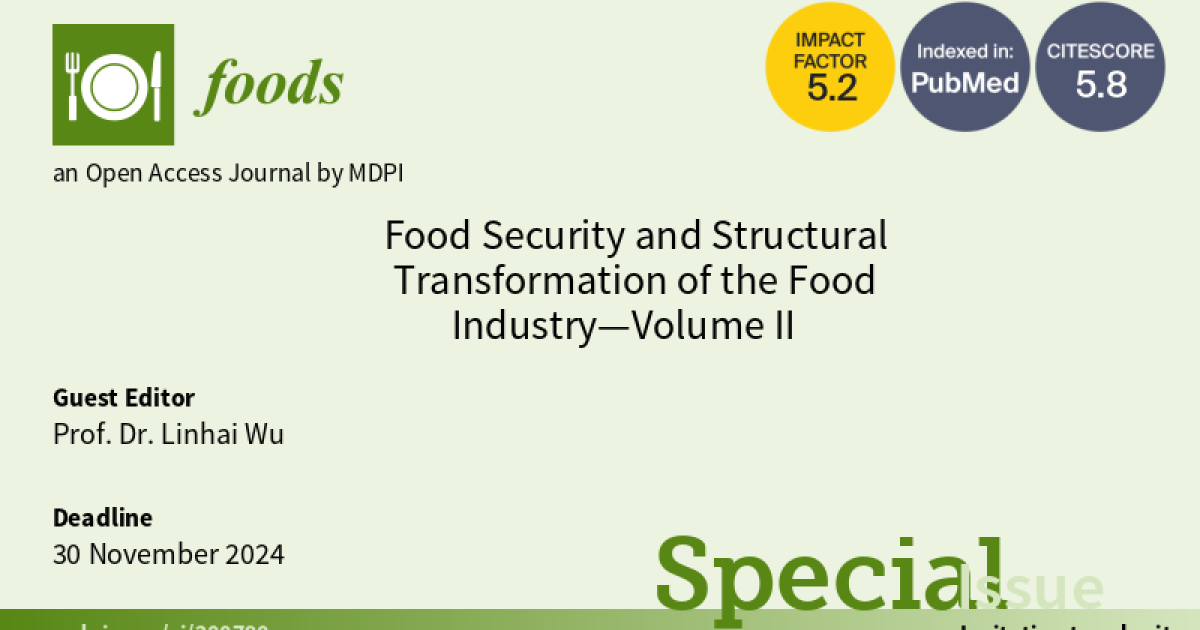Food Security and Structural Transformation of the Food Industry—Volume II
A special issue of Foods (ISSN 2304-8158). This special issue belongs to the section "Food Security and Sustainability".
Deadline for manuscript submissions: closed (30 November 2024) | Viewed by 9729

Special Issue Editor
Interests: food safety risk management; food industry structural transformation; international food trade; food safety cross boundary governance; food safety societal co-governance
Special Issues, Collections and Topics in MDPI journals
Special Issue Information
Dear Colleagues,
The COVID-19 pandemic has dramatically changed our way of life, including the way we interact with food. As we adapt to the new normal of the pandemic, the food industry is also undergoing profound structural transformation. For example, food security concerns such as fluctuations in the price of food, changes in the patterns of household and restaurant food waste, health risks introduced by take-out orders, etc., have arisen. Food security researchers have collected various data in order to investigate issues concerning food security. As a result, we feel that it is the right time to organize a Special Issue addressing food security and the structural transformation of the food industry. We are looking for papers that investigate issues regarding food security related to the impact of the pandemic, offer critical reflections and provide a forward-looking discussion on future expectations in the realm of food security.
Prof. Dr. Linhai Wu
Guest Editor
Manuscript Submission Information
Manuscripts should be submitted online at www.mdpi.com by registering and logging in to this website. Once you are registered, click here to go to the submission form. Manuscripts can be submitted until the deadline. All submissions that pass pre-check are peer-reviewed. Accepted papers will be published continuously in the journal (as soon as accepted) and will be listed together on the special issue website. Research articles, review articles as well as short communications are invited. For planned papers, a title and short abstract (about 100 words) can be sent to the Editorial Office for announcement on this website.
Submitted manuscripts should not have been published previously, nor be under consideration for publication elsewhere (except conference proceedings papers). All manuscripts are thoroughly refereed through a single-blind peer-review process. A guide for authors and other relevant information for submission of manuscripts is available on the Instructions for Authors page. Foods is an international peer-reviewed open access semimonthly journal published by MDPI.
Please visit the Instructions for Authors page before submitting a manuscript. The Article Processing Charge (APC) for publication in this open access journal is 2900 CHF (Swiss Francs). Submitted papers should be well formatted and use good English. Authors may use MDPI's English editing service prior to publication or during author revisions.
Keywords
- green/sustainable development
- food consumption
- coronavirus disease 2019 (COVID-19)
- food security
- international food trade
- food-related E-commerce
- global food industry
- carbon emissions and eco-friendly development
- take-out food industry
- dietary habits and health
Benefits of Publishing in a Special Issue
- Ease of navigation: Grouping papers by topic helps scholars navigate broad scope journals more efficiently.
- Greater discoverability: Special Issues support the reach and impact of scientific research. Articles in Special Issues are more discoverable and cited more frequently.
- Expansion of research network: Special Issues facilitate connections among authors, fostering scientific collaborations.
- External promotion: Articles in Special Issues are often promoted through the journal's social media, increasing their visibility.
- Reprint: MDPI Books provides the opportunity to republish successful Special Issues in book format, both online and in print.
Further information on MDPI's Special Issue policies can be found here.






